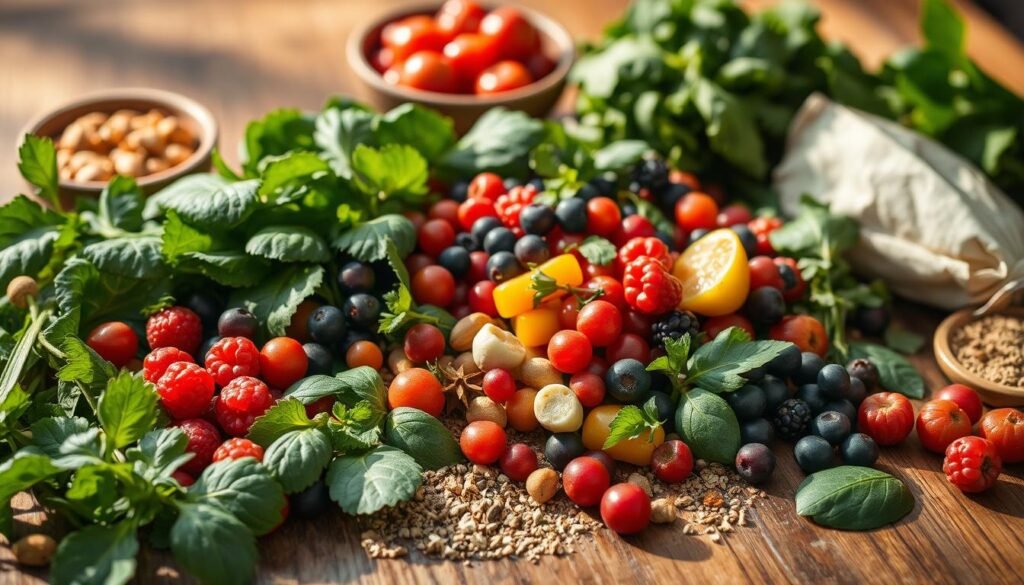For those with arthritis, finding relief is a big challenge. Studies show that a plant-based diet can help. It can lower inflammation and ease arthritis relief.
Eating more fruits, veggies, and whole grains can help with arthritis. Adding anti-inflammatory foods to your diet might cut down on medication. This can make life better for many people.
Choosing the right foods can help manage arthritis symptoms. This article will look at how a plant-based arthritis diet can help. We’ll talk about the best foods to fight inflammation.
Key Takeaways
- Incorporating anti-inflammatory foods can help alleviate arthritis symptoms.
- A plant-based diet rich in fruits and vegetables can reduce inflammation.
- Dietary changes can potentially reduce reliance on medication.
- Making informed food choices is crucial for managing arthritis.
- A well-planned diet can improve overall quality of life for arthritis sufferers.
Understanding Arthritis and Its Causes
It’s important to know what causes and types of arthritis are. Arthritis is a term for many conditions that cause joint pain and swelling.
There are many types of arthritis, each with its own symptoms. The most common ones are osteoarthritis, rheumatoid arthritis, and psoriatic arthritis.
Types of Arthritis and Their Symptoms
Osteoarthritis is the most common type. It happens when joints wear out over time. Rheumatoid arthritis is an autoimmune disease that attacks the joints, causing pain and swelling.
Psoriatic arthritis is linked to psoriasis, causing joint pain and swelling. Other types include gout, lupus, and fibromyalgia, each with its own symptoms.
| Type of Arthritis | Primary Symptoms |
|---|---|
| Osteoarthritis | Joint pain, stiffness, limited mobility |
| Rheumatoid Arthritis | Joint inflammation, pain, swelling, fatigue |
| Psoriatic Arthritis | Joint pain, swelling, skin psoriasis |
Common Risk Factors for Arthritis
Several factors can increase the risk of getting arthritis. These include genetics, age, obesity, and past joint injuries. Knowing these can help prevent and treat arthritis early.
Genetics play a big role in getting certain types of arthritis, like rheumatoid arthritis. Age also matters, as the risk goes up with it.
The Role of Inflammation in Arthritis
Inflammation is key in arthritis, especially in rheumatoid arthritis. It causes joint damage and pain. Fighting inflammation is key to arthritis relief.
Studies show that diet and lifestyle changes can lower inflammation. Eating anti-inflammatory foods can help ease arthritis symptoms.
The Benefits of a Plant-Based Diet for Arthritis
Studies show that foods that fight inflammation are key in managing arthritis. A vegan diet for arthritis is full of nutrients and antioxidants. These help fight inflammation and may lessen arthritis symptoms.
How Plant-Based Foods Combat Inflammation
Plant-based foods are naturally anti-inflammatory. They are packed with antioxidants, polyphenols, and other good stuff. These nutrients help reduce body stress and inflammation, making it harder for arthritis to get worse.
Key components of plant-based foods that combat inflammation include:
- Antioxidants found in berries and leafy greens
- Polyphenols present in green tea and dark chocolate
- Fiber-rich foods like legumes and whole grains
Nutritional Benefits of a Plant-Based Diet
Going plant-based is good for more than just arthritis. It’s also packed with vitamins, minerals, and fiber from fruits, veggies, and whole grains. This ensures your body gets what it needs.
| Nutrient | Plant-Based Source | Benefit |
|---|---|---|
| Vitamin C | Oranges, Bell Peppers | Boosts immune system |
| Omega-3 Fatty Acids | Chia Seeds, Flaxseeds | Reduces inflammation |
| Fiber | Legumes, Whole Grains | Supports digestive health |
Long-Term Health Benefits Beyond Arthritis
Choosing a plant-based diet offers many long-term health perks. It can lower your risk of heart disease, type 2 diabetes, and some cancers. This leads to better overall health and a longer life.
By eating whole, nutrient-rich foods, you can see big health improvements. This can greatly improve your life quality.
Key Anti-Inflammatory Foods to Include
To fight inflammation, add certain foods to your plant-based diet. These foods taste great and are full of nutrients. They help lower inflammation and ease arthritis symptoms.
Leafy Greens: Benefits of Spinach and Kale
Spinach and kale are full of antioxidants and nutrients. They’re also rich in vitamins A, C, and K. This makes them great for salads, smoothies, and sautéed dishes.
Nutritional Highlights:
- Rich in antioxidants
- High in vitamins A, C, and K
- Supports overall health
Nuts and Seeds: Chia, Flaxseeds, and Walnuts
Nuts and seeds are full of healthy fats and antioxidants. Chia seeds, flaxseeds, and walnuts are especially good. They have lots of omega-3 fatty acids, which fight inflammation.
| Nut/Seed | Benefit |
|---|---|
| Chia Seeds | Rich in omega-3s, fiber |
| Flaxseeds | High in omega-3s, antioxidants |
| Walnuts | Rich in omega-3s, antioxidants |
Colorful Fruits: Berries, Oranges, and Pineapples
Colorful fruits are not just pretty. They’re also full of vitamins and antioxidants. Berries, oranges, and pineapples are great because of their vitamin C and anti-inflammatory compounds.
Adding these fruits to your diet is easy. Just toss them in your breakfast cereal or enjoy them as a snack.
The Role of Omega-3 Fatty Acids
Omega-3 fatty acids are key in a plant-based diet for arthritis relief. They help reduce inflammation, which is a major cause of arthritis symptoms.
Sources of Plant-Based Omega-3s
Many think omega-3s come only from fish. But, there are many plant-based sources that are just as good. Some of the best sources include:
- Chia seeds
- Flaxseeds
- Walnuts
- Algal oil
- Hemp seeds
Adding these foods to your diet is easy. You can mix chia seeds or flaxseeds into your cereal or yogurt. Enjoy walnuts as a snack, or take algal oil as a supplement.
How Omega-3s Help with Arthritis Symptoms
Omega-3s reduce inflammation in the body. This helps lessen joint pain and swelling. It makes life better for people with arthritis.
A study showed omega-3s improve arthritis symptoms. It found better joint pain and function. Here’s a summary:
| Study Group | Improvement in Joint Pain | Improvement in Joint Function |
|---|---|---|
| Omega-3 Supplementation | 30% | 25% |
| Placebo Group | 5% | 3% |
Omega-3s clearly helped reduce pain and improve function. This was more than the placebo group.
In short, omega-3 fatty acids are vital for managing arthritis on a plant-based diet. Knowing their sources and benefits helps people choose better foods for their symptoms.
The Importance of Whole Grains
Whole grains are key in fighting inflammation, which helps with arthritis relief. They are full of fiber, nutrients, and antioxidants. These help fight inflammation and boost health.
Whole Grain vs. Refined Carbohydrates
Refined carbs like white bread and sugary snacks lack nutrients. They are mostly empty calories that can make inflammation worse. On the other hand, whole grains have bran, germ, and endosperm. They are packed with fiber, vitamins, and minerals.
Key differences between whole grains and refined carbohydrates include:
- Higher fiber content in whole grains helps reduce inflammation and promote digestive health.
- Rich in antioxidants and phytochemicals that combat oxidative stress and inflammation.
- Lower glycemic index, which helps regulate blood sugar levels and insulin response.
Examples of Anti-Inflammatory Whole Grains
Adding different whole grains to your diet can be very beneficial. Some anti-inflammatory whole grains are:
- Quinoa: A complete protein and rich in antioxidants and minerals.
- Brown rice: High in fiber and manganese, which helps reduce inflammation.
- Oats: Rich in beta-glucans, which have been shown to reduce inflammation and improve heart health.
- Whole wheat: Rich in fiber, vitamins, and minerals that help combat inflammation.
By adding these whole grains to your plant-based diet, you can fight inflammation. This helps ease arthritis symptoms and improves joint health and overall well-being.
Herbs and Spices That Aid Relief
Certain herbs and spices have anti-inflammatory properties that help with arthritis. They can be added to daily meals to manage symptoms.
Turmeric: Its Curcumin Content Explained
Turmeric, a bright yellow spice, is found in curry dishes. It has a compound called curcumin. Curcumin is powerful against inflammation and is good for antioxidants. It’s great for those with arthritis.
Studies show curcumin can lessen joint inflammation. It also helps ease arthritis symptoms.
Ginger: The Anti-Inflammatory Powerhouse
Ginger has been used for centuries for its health benefits. It’s known for reducing inflammation. Gingerol, the active compound in ginger, fights inflammation. This can help with arthritis pain and improve joint movement.
You can add ginger to your meals. Try it in teas, soups, or stir-fries.
Garlic: Benefits for Joint Health
Garlic is more than just a flavor enhancer. It can help with arthritis relief. It has compounds that fight inflammation, which can lessen arthritis symptoms. Regular garlic use can improve joint health by reducing inflammation and boosting overall well-being.
Adding these herbs and spices to your diet is a simple way to manage arthritis. Knowing their benefits and how to use them can help you take care of your health.
The Impact of Processed Foods on Arthritis
Processed foods can make arthritis symptoms worse. It’s important to know which ones to avoid. Our diets often include a lot of processed foods, which are bad for us.
These foods have unhealthy fats, sugars, and refined carbs. They can cause inflammation, which is a big problem for arthritis.
Identifying Processed Foods to Avoid
To fight arthritis, we need to know which foods to stay away from. Things like packaged snacks, frozen meals, and sugary drinks are bad. They have AGE products that can make inflammation and damage joints worse.
Key processed foods to avoid:
- Packaged snacks high in preservatives and unhealthy fats
- Frozen meals with high sodium content
- Sugary drinks and desserts
- Refined grains like white bread and pasta
How Sugar and Refined Carbs Increase Inflammation
Sugar and refined carbs quickly raise blood sugar levels. This can make arthritis symptoms worse. It also leads to weight gain and insulin resistance, both of which increase inflammation.
Reducing sugar and refined carbs can help. Eating whole foods like veggies, fruits, and whole grains is better. They give us nutrients and help avoid inflammation.
Meal Planning for a Plant-Based Arthritis Diet
Planning your meals is key to a plant-based diet that fights arthritis. A good diet balances nutrients and helps control arthritis symptoms.
Tips for Transitioning to a Plant-Based Diet
Switching to a vegan arthritis diet or a plant-based arthritis diet needs careful planning. Here are some tips to help you:
- Start by adding more plant-based meals to your diet slowly.
- Try different plant-based proteins like legumes, nuts, and seeds.
- Make sure your meals have lots of colorful veggies and fruits for nutrients.
- Try to avoid processed foods and sugars.
A health expert says, “A diet full of fruits, veggies, and whole grains can cut down inflammation and boost health.”
“The right diet can be a powerful tool in managing arthritis.”
Sample Meal Plan for a Week
Here’s a meal plan to start your plant-based arthritis diet:
| Day | Breakfast | Lunch | Dinner |
|---|---|---|---|
| Monday | Oatmeal with berries | Quinoa salad with roasted vegetables | Lentil soup |
| Tuesday | Smoothie bowl with spinach and banana | Whole grain wrap with hummus and vegetables | Grilled tofu with steamed broccoli |
| Wednesday | Avocado toast on whole grain bread | Chickpea salad with mixed greens | Vegan stir-fry with brown rice |
Easy and Delicious Recipes to Try
Here are some tasty recipes to try:
- Turmeric Lentil Soup: A warm soup with lentils, turmeric, and veggies.
- Roasted Vegetable Quinoa Bowl: A bowl with roasted veggies, quinoa, and a tangy dressing.
- Chia Seed Pudding: A healthy dessert or snack with chia seeds, almond milk, and fruits.

By following these tips and meal plans, you can easily switch to a plant-based arthritis diet. It helps manage arthritis and boosts your health.
Supplements and Vitamins for Arthritis Relief
Choosing the right supplements and vitamins can greatly help manage arthritis. They offer natural ways to ease pain. A balanced diet is key, but some nutrients are especially important for bone health and reducing inflammation.
Role of Vitamin D and Calcium
Vitamin D and calcium are vital for bone health, especially for those with arthritis. Vitamin D helps the body use calcium, which is essential for strong bones. Many people with arthritis lack vitamin D, and taking supplements can help ease symptoms.
Benefits of Vitamin D and Calcium:
- Supports bone density
- Aids in calcium absorption
- May reduce the risk of fractures
Eating foods high in calcium and getting enough vitamin D can help manage arthritis. Dairy, leafy greens, and fortified plant-based milk are good sources of calcium.
| Nutrient | Food Sources | Benefits for Arthritis |
|---|---|---|
| Vitamin D | Fatty fish, fortified dairy, sunlight exposure | Enhances calcium absorption, supports bone health |
| Calcium | Dairy products, leafy greens, fortified plant-based milk | Essential for bone density, muscle function |
Importance of Antioxidants in the Diet
Antioxidants are key in fighting oxidative stress and inflammation linked to arthritis. Vitamins C and E, along with selenium and beta-carotene, protect cells from harm.
Key Antioxidants and Their Sources:
- Vitamin C: citrus fruits, berries, leafy greens
- Vitamin E: nuts, seeds, vegetable oils
- Selenium: Brazil nuts, fish, turkey
- Beta-carotene: carrots, sweet potatoes, spinach
Eating foods rich in antioxidants can help manage arthritis symptoms and boost overall health.
Lifestyle Changes for Optimal Arthritis Management
Managing arthritis well means making lifestyle changes, not just diet ones. A plant-based diet is key, but other lifestyle factors help too. They can ease symptoms and boost overall health.
The Benefits of Regular Exercise
Exercise is a must for arthritis management. It keeps joints moving, strengthens muscles, and cuts down pain and stiffness. Yoga, swimming, and cycling are great because they’re easy on the joints.
Exercise also boosts heart health, lowers disease risk, and lifts mood. People with arthritis should aim for the right balance of activity and rest.
Mindfulness and Stress Reduction Techniques
Mindfulness and stress-reducing methods are vital for arthritis control. Stress can make symptoms worse. Meditation, deep breathing, and muscle relaxation can lower stress and improve health.
Mindfulness helps people with arthritis pay attention to their body’s needs. This makes it easier to handle pain and symptoms. Adding these practices to daily life can help manage arthritis better.
Consulting with Healthcare Professionals
Healthcare professionals are key in managing arthritis through diet and lifestyle. They create personalized plans that meet specific needs and health conditions.
When to Seek Professional Advice
It’s crucial to talk to healthcare professionals before starting new diets or exercise. They guide on the best methods and track progress.
Key scenarios to seek professional advice include:
- Before making significant changes to your diet or exercise routine
- If you’re experiencing increased symptoms or flare-ups
- When considering supplements or vitamins for arthritis relief
The Role of Dietitians in Managing Arthritis
Dietitians focus on nutrition and diet. They craft meal plans that manage arthritis symptoms and boost overall health.
“A well-balanced diet rich in anti-inflammatory foods can significantly impact arthritis management. Consulting with a dietitian can help individuals make informed choices.” –
A dietitian can assist in:
| Service | Description |
|---|---|
| Personalized Meal Planning | Creating a diet plan tailored to individual nutritional needs and health goals |
| Nutritional Education | Educating patients on the benefits of various foods and nutrients |
| Monitoring Progress | Regularly assessing the effectiveness of the diet plan and making necessary adjustments |
Working with healthcare professionals helps develop a detailed plan for managing arthritis. This team effort ensures a holistic approach to health, leading to better results.
Real-Life Success Stories
A growing number of people support the benefits of a plant-based diet for arthritis symptoms. Many have found relief from arthritis by changing their diet.

Transformations Through a Plant-Based Diet
Many have seen big improvements with a plant-based arthritis diet. Sarah, 55, cut her arthritis pain by switching to plants. She says eating more fruits, veggies, and whole grains helped her arthritis and overall health.
John, 62, noticed less morning stiffness and pain after going plant-based. He credits the diet’s anti-inflammatory foods for his better health.
Testimonials from Arthritis Sufferers
People who tried a plant-based diet for arthritis relief share their stories. Emily, 45, saw her arthritis symptoms drop after three months on a plant-based diet.
Michael, too, cut his medication by going plant-based. He says a plant-based diet and exercise help him manage arthritis.
These stories show how a plant-based diet can help with arthritis. Eating anti-inflammatory foods and avoiding processed foods can help manage symptoms.
Additional Resources and Support
Looking for ways to ease arthritis with a plant-based diet? There’s a lot of help out there. You can find lots of information and support to help you on your journey.
Books and References on Arthritis and Diet
Want to learn more about fighting arthritis with food? There are some great books out there. They dive deep into how diet changes can help manage arthritis.
- The Plant Paradox by Dr. Steven Gundry
- The Blue Zones by Dan Buettner
- Arthritis: Dietary Therapy for Arthritis various authors
These books share important insights. They show how a plant-based diet can help manage arthritis.
Online Communities and Support Groups
Online groups and forums are great for meeting others who face similar challenges. They’re a place to share stories, ask for advice, and get encouragement.
| Platform | Description | Focus |
|---|---|---|
| Reddit – r/PlantBasedDiet | A community discussing plant-based diets | General Plant-Based Diet |
| Arthritis Foundation Online Community | A support group for people with arthritis | Arthritis Management |
| Facebook Groups – Vegan Arthritis Support | A group for those using vegan diets to manage arthritis | Vegan Diet for Arthritis |
These online spots are perfect for getting support and staying up-to-date with new research.
By using these resources, you can learn more and connect with others who get what you’re going through.
Frequently Asked Questions About Plant-Based Diets
More people are looking into plant-based diets for arthritis relief. But, there are still many questions. It’s important to tackle these concerns and find answers.
Is a Plant-Based Diet Suitable for Everyone?
Most people can benefit from a plant-based diet. It’s full of nutrients and antioxidants that fight inflammation. But, it’s not right for everyone, especially those with certain health issues or dietary needs.
“A well-planned plant-based diet can provide all the necessary nutrients for good health.”
To make sure a plant-based diet works for you, consider these steps:
- Get advice from a healthcare professional or a registered dietitian.
- Eat a variety of foods, like fruits, veggies, whole grains, and legumes.
- Watch out for nutrient gaps, like vitamin B12, iron, and omega-3 fatty acids.
| Nutrient | Plant-Based Sources |
|---|---|
| Vitamin B12 | Fortified plant milk, nutritional yeast |
| Iron | Legumes, dark leafy greens, fortified cereals |
| Omega-3 Fatty Acids | Flaxseeds, chia seeds, walnuts, algae oil supplements |
How Long Before Noticing Improvements?
How long it takes to see benefits from a plant-based diet varies. Some people feel better in weeks, while others take months.
Several things can affect how long it takes:
- The severity of arthritis symptoms.
- The extent of dietary changes.
- Overall lifestyle, including physical activity and stress levels.
Sticking to a balanced plant-based diet, staying active, and managing stress helps manage arthritis. It’s also key to keep an eye on your health and adjust your diet as needed. Always do this with the help of a healthcare professional.
Conclusion: Embracing a Plant-Based Approach
Adopting a plant-based diet can help reduce arthritis symptoms and improve long-term health. Understanding arthritis causes and inflammation is key. This knowledge helps in making better diet and lifestyle choices.
Recap of Key Points
This article has shown how a plant-based diet can manage arthritis. Foods like leafy greens, nuts, and colorful fruits are great for health. Omega-3 fatty acids, whole grains, and herbs like turmeric and ginger are also beneficial.
- Leafy greens like spinach and kale are rich in antioxidants.
- Nuts and seeds such as chia, flaxseeds, and walnuts provide omega-3 fatty acids.
- Colorful fruits including berries, oranges, and pineapples are packed with vitamins and minerals.
These foods help reduce inflammation and improve overall health. It’s also crucial to avoid processed foods and sugar, as they can worsen arthritis symptoms.
Encouragement for a Healthier Lifestyle
Choosing a plant-based diet is a step towards a healthier life. As Dr. Andrew Weil said,
“The most important thing you can do for your health is to eat a diet that is as natural as possible.”
This natural eating approach can greatly help manage arthritis and improve health.
By following the dietary and lifestyle tips shared, people can see big improvements in their arthritis symptoms. It’s about committing to a healthier lifestyle that lasts.
“The food you eat can either be the safest and most powerful form of medicine, or the slowest form of poison.” This quote highlights the critical role of diet in managing health conditions like arthritis.
Call to Action: Start Your Journey Today
Starting a vegan arthritis diet can change your life. It helps manage arthritis symptoms and boosts your health. Eating anti-inflammatory foods and living a plant-based life can improve your well-being.
Practical Tips for a Smooth Transition
Begin by adding leafy greens, nuts, and colorful fruits to your diet. Try new vegan recipes and plan your meals. Getting advice from a dietitian or healthcare professional can help make a plan just for you.
Finding Support in Your Journey
Join local workshops or support groups for help and motivation. Connecting with others who have similar health goals can keep you on track. Look for online and local groups focused on plant-based living and anti-inflammatory diets.
By following these steps, you can start enjoying the benefits of a vegan arthritis diet. You’ll be on your way to a healthier, more vibrant life.



